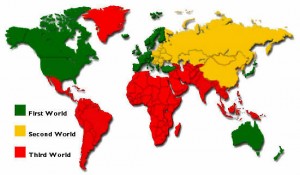February 2011
 The term “third world” labels the least developed countries (LDC’s), and hence poorest nations, in the world. This term originated during the Cold War to define the countries that were exploited as either non-aligned or non-developed. The term third world (or “tiers minde” in French) was first used by the French demographer Alfred Suavy in 1952; he took the expression from the term “third estate” which described the lowest class in France before and during the French Revolution. Suavy wrote, “the third world is nothing, and it wants to be something”. By the end of the 1950’s the term was being used to describe the LDC’s of the world; generally countries in Asia, Africa, Oceania and Latin America.
The term “third world” labels the least developed countries (LDC’s), and hence poorest nations, in the world. This term originated during the Cold War to define the countries that were exploited as either non-aligned or non-developed. The term third world (or “tiers minde” in French) was first used by the French demographer Alfred Suavy in 1952; he took the expression from the term “third estate” which described the lowest class in France before and during the French Revolution. Suavy wrote, “the third world is nothing, and it wants to be something”. By the end of the 1950’s the term was being used to describe the LDC’s of the world; generally countries in Asia, Africa, Oceania and Latin America.
Third world countries are characterized by their distorted and highly dependent economies. Although these countries are often very different from each other they have common traits of; high birth rates, corruption and lack of infrastructure, poor living conditions, limited education and heath care, lack of industrialization and technology, and overall poverty.
Despite efforts and even improvements from foreign aid the problem of these underdeveloped nations have failed to be solved. Still, an over whelming majority of the worlds population suffers from systemic poverty. Where progress has been made the development is generally distorted among populations and groups.
Although the “how” is not always consented; all international organizations agree that action is required to improve the conditions of third world countries.
Distribution
Within third world countries wealth is distributed unevenly. I am currently in Brazil where although many people are able to work and live well the majority continues to live in poverty. Lacking education and opportunity many people are without clean water and the basic necessities.
Sometimes when driving the streets of Brazil I can literally see beautiful summer houses on the right (in the exclusive fenced off beach clubs) and slums (lacking electricity and running water) on the left.
On December 27, 2010 students in Brazil protested a wage increase for the president, vice-president, ministers and congressmen that was approved by the Congress. msnbc.com “The government of Brazil has increased some of their own salaries by as much as 163% despite the fact that the hospitals are unable meet the needs of the population.” RBS Porto Alegre
Investologist Prognostication
Jeremy Leonard
“A fish is the last one to realize the importance of water” – a French proverb.
Yesterday, February 17, 2011, I sold all of the Mullen shares that I have been sitting on for $22.00 per share. The last time I bought Mullen (and announced it here) was at the depth of the market crash at $9.00 per share. I do still think that Mullen will continue to increase in value, but I am taking a 30% gain since January 1, 2011 off the table. Mr. Market might stumble and leave Mullen and other oil related companies deflating a little bit. If that happens I would regret not taking real profits, and the pain of losing money is greater than the pleasure of making money, so I am hedging things in the right direction.
I still have a significant stake in TitanStar Properties (TSP-X), and I have quite a lot of Connacher Oil and Gas (CLL-T). So I am not completely free of the public market.
I will absolutely be increasing my exposure to the public market over time, but there is a lot of renewed interest in the market now, and that gives me pause. Back when I was buying H&R REIT for less than five dollars per share and loading up on Mullen stock, it seemed like I was all by myself….
Take care
